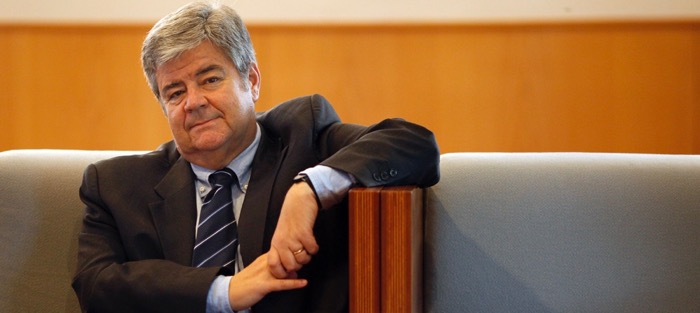29.05.2017 - 10:09
|
Actualització: 29.05.2017 - 10:10
The economist Guillem López Casasnovas received us in his office of the Pompeu Fabra University’s Ciutadella campus, where he is a professor. It is just two months since he finished his mandate as a councillor of the Bank of Spain. We talk to him about his experience in the main banking institution of the Spanish State and ask him how he views the path to the independence of Catalonia.
—You have ended your position as councillor of the Bank of Spain after twelve years, you must have seen something of everything?
—Three governors, three styles of supervision in three different situations. It was a very valuable learning process, not so much for my pocket as for the human capital it brought me.
—Did you find what you expected? Is it highly politicised? You managed the period of the crisis …
—I have seen it all. When I went in, in 2005 when Caruana was there, the message was ‘Spain is going well’. It was admired … we had a great financial system … All of this went terribly wrong in 2008 due to a tidal wave of painful consequences. And in my last phase in 2015, 2016 and a little of 2017, the economy has been seen to recover, but not as I would like it. It’s been a kind of roller coaster.
—And with the experience you have accumulated in the Bank of Spain, are you ready to help to create the public bank of the Catalan republic?
—The law for the creation of the Central Bank of Catalonia is already in place. From what I have seen, it is a modern law, I would say more powerful than the leading organs of the Bank of Spain. It is an ex novo law made by people who show that they know what they are doing, so the problems of the creation of the bank will not come from not having a good law; they will come from Spain’s reaction and what Europe does about its practical application, for instance in the systems of payment, the access to liquidity, the continuity of the European Central Bank’s discount assets … But the design is already in place and it would be great if everything were just a question of legalties.
—How will the financial sector react in the case of independence? Before the 27-S selections, the banking association threatened to leave Catalonia. Are they willing to lose the business?
—You have answered your own question. Declarations of this kind cannot be expected or demanded, as far as I can see. Money, everyone’s money, is a fearful thing and the only ones to take up a position were those of the Spanish banking association. I know that many bankers did not like that position being taken up before the elections. I perfectly remember one of Rajoy’s meetings in Lleida in which he called on the Catalan bankers to come out against the process. That was a Sunday, and it happened on the Monday, on the Tuesday, the Wednesday … We do not expect a declaration in favour and we are glad there was none against.
—Are you an independentist?
—I still cannot believe the situation we are in: Catalonia’s value for Spain, and that Spain is not reacting. I can’t believe it. I don’t expect political wisdom, given the kind of predominant politics, but I would expect the great men of the court of Bernabéu to realise that we are all going to get hurt. I can’t understand their being so blunt over an issue like this. I still write about joint tax formulae and systems for reforming the system of financing, which means I haven’t taken it on board yet. If I had, I would think I was wasting my time, but in my daily learning, going to the tax reform commissions, talking with my colleagues and the general managers … I feel more and more disappointed, because I see no reaction, and now I don’t know whether the state will ever react.
—Do you think we have learnt some lesson from the economic crisis?
—What I see is that some are acting more or less the same, with a more serious circumstance; during the crisis, we flooded the world with liquidity. This was done by the Federal reserve, the Bank of England, the European central Bank, the Bank of Japan … What do we have now? A more or less stagnant economy, some countries above and others below, but in all cases with enormous liquidity. So the muscle of real production and economic activity is still weak, but with a huge amount of blood flowing through it.
—That is very dangerous …
—Many symptoms of a stroke. There is a large offer of money but demand is still weak, so the price of money drops, and anyone can understand this. Those looking for yield on their money are told they will not find it in the normal market, but that they have to go in search of new, unknown things. Derivatives, bubbles starting up, some natural resource, seasonal rentals … These are all applications of people who have a lot of money and know that the banks won’t give them anything. There is investment in strange things. It isn’t normal for rentals to be so high in Barcelona, for instance. It isn’t normal that property prices in my town have begun to rise like before the crisis. Now I won’t take any risk by announcing it, but I am not sure that we won’t have another collapse.



